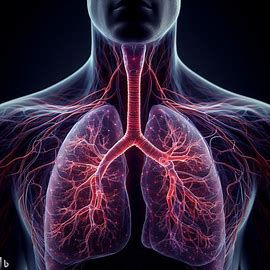Title: Reflexology: A Holistic Approach to Respiratory Health
- Jerry’s Garden
- Nov 12, 2023
- 2 min read
Reflexology, an alternative therapy based on the principle that specific areas on the feet, hands, and ears correspond to organs and systems in the body, has shown promising links to aiding respiratory health. This practice is believed to stimulate the body's natural healing mechanisms, impacting both the psychological and physiological aspects of respiratory issues.
Recent research has shown that reflexology may be beneficial for respiratory issues, including long COVID. A 2021 study found that reflexology helped improve lung function and reduce inflammation in patients with chronic obstructive pulmonary disease (COPD). Another study found that reflexology helped reduce anxiety and improve sleep quality in patients with asthma (https://www.cambridge.org/core/journals/the-british-journal-of-psychiatry/article/psychological-consequences-of-long-covid-comparing-trajectories-of-depressive-and-anxiety-symptoms-before-and-after-contracting-sarscov2-between-matched-long-and-shortcovid-groups/923140B3F95F1158C0CDC188002531AE , https://www.psychologytoday.com/us/blog/urban-survival/202207/the-negative-psychological-effects-long-covid

Physiological Benefits:
Research suggests that reflexology can potentially support respiratory function by reducing stress and promoting relaxation. By applying pressure to specific reflex points associated with the lungs and respiratory system, reflexology may help improve circulation, enhance oxygen delivery, and relieve tension in the corresponding areas of the body. This process could potentially assist in reducing symptoms of respiratory conditions such as asthma, bronchitis, or sinus problems.
Psychological Benefits:
Furthermore, the relaxation induced by reflexology sessions can positively influence mental well-being. Stress and anxiety are known contributors to respiratory problems, and reflexology's calming effects can aid in alleviating these psychological factors. The reduction of stress may indirectly support the respiratory system's overall health and functionality.
If you’re interested in trying reflexology, it’s important to find a qualified reflexologist who can provide safe and effective treatment.
1. The Federation of Holistic Therapists (FHT): The FHT is the largest professional body for complementary, beauty, and sports therapists in the UK. Established in 1962, the FHT was the first international organization of its kind, set out to protect the public’s health by ensuring high standards in both training and practice. The FHT accepts over 350 therapies and has over 10,000 members worldwide (http://fht.org.uk/ )
2. The Association of Reflexologists (AoR): The AoR is a professional body that represents reflexologists in the UK. It provides a directory of qualified practitioners and offers training courses and workshops for reflexologists.
3. The British Reflexology Association (BRA): The BRA is a representative body for persons practicing the method of reflexology as a profession and for students interested in learning reflexology. The BRA also aims to promote the practice of reflexology in Great Britain and abroad.
4. The International Federation of Reflexologists (IFR): The IFR is a non-profit organization that represents reflexologists worldwide. It provides a directory of qualified practitioners and offers training courses and workshops for reflexologists.
In conclusion, while reflexology isn’t a standalone treatment for respiratory problems, its holistic approach, when combined with standard medical care, could offer valuable support for individuals managing respiratory issues. Its ability to address both the physical and psychological facets of health makes it a compelling complementary therapy worth exploring.
Become certified Reflexologist:
Hair and beauty Academy (Doncaster branch)
7 Thorne Road, DN1 2HJ
Contact: Leanne Timms - leanne.timms@learningcurvegroup.co.uk
Courses available: L3 Complementary Therapies, L3 Reflexology
- funding available
- VTCT qualification
- Aromatherapy, Reflexology, Body Massage.
Thank you for reading, don't forget to sign up for more.








